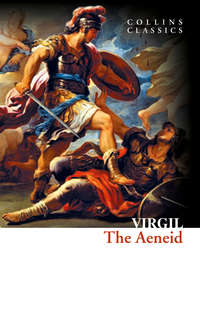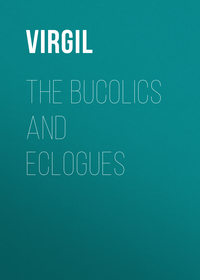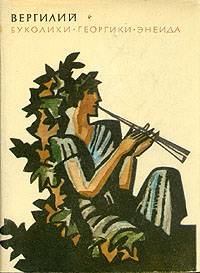
The Aeneid of Virgil
Thus lord Aeneas with all attent retold alone the divine doom and the history of his goings. At last he was hushed, and here in silence made an end.
BOOK FOURTH
THE LOVE OF DIDO, AND HER END
But the Queen, long ere now pierced with sore distress, feeds the wound with her life-blood, and catches the fire unseen. Again and again his own valiance and his line's renown flood back upon her spirit; look and accent cling fast in her bosom, and the pain allows not rest or calm to her limbs. The morrow's dawn bore the torch of Phoebus across the earth, and had rolled away the dewy darkness from the sky, when, scarce herself, she thus opens her confidence to her sister:
'Anna, my sister, such dreams of terror thrill me through! What guest unknown is this who hath entered our dwelling? How high his mien! how brave in heart as in arms! I believe it well, with no vain assurance, his blood is divine. Fear proves the vulgar spirit. Alas, by what destinies is he driven! what wars outgone he chronicled! Were my mind not planted, fixed and immoveable, to ally myself to none in wedlock since my love of old was false to me in the treachery of death; were I not sick to the heart of bridal torch and chamber, to this temptation alone I might haply yield. Anna, I will confess it; since Sychaeus mine husband met his piteous doom, and our household was shattered by a brother's murder, he only hath touched mine heart and stirred the balance of my soul. I know the prints of the ancient flame. But rather, I pray, may earth first yawn deep for me, or the Lord omnipotent hurl me with his thunderbolt into gloom, the pallid gloom and profound night of Erebus, ere I soil thee, mine honour, or unloose thy laws. He took my love away who made me one with him long ago; he shall keep it with him, and guard it in the tomb.' She spoke, and welling tears filled the bosom of her gown.
Anna replies: 'O dearer than the daylight to thy sister, wilt thou waste, sad and alone, all thy length of youth, and know not the sweetness of motherhood, nor love's bounty? Deemest thou the ashes care for that, or the ghost within the tomb? Be it so: in days gone by no wooers bent thy sorrow, not in Libya, not ere then in Tyre; Iarbas was slighted, and other princes nurtured by the triumphal land of Africa; wilt thou contend so with a love to thy liking? nor does it cross thy mind whose are these fields about thy dwelling? On this side are the Gaetulian towns, a race unconquerable in war; the reinless Numidian riders and the grim Syrtis hem thee in; on this lies a thirsty tract of desert, swept by the raiders of Barca. Why speak of the war gathering from Tyre, and thy brother's menaces? . . . With gods' auspices to my thinking, and with Juno's favour, hath the Ilian fleet held on hither before the gale. What a city wilt thou discern here, O sister! what a realm will rise on such a union! the arms of Troy ranged with ours, what glory will exalt the Punic state! Do thou only, asking divine favour with peace-offerings, be bounteous in welcome and draw out reasons for delay, while the storm rages at sea and Orion is wet, and his ships are shattered and the sky unvoyageable.' With these words she made the fire of love flame up in her spirit, put hope in her wavering soul, and let honour slip away.
First they visit the shrines, and desire grace from altar to altar; they sacrifice sheep fitly chosen to Ceres the Lawgiver, to Phoebus and lord Lyaeus, to Juno before all, guardian of the marriage bond. Dido herself, excellent in beauty, holds the cup in her hand, and pours libation between the horns of a milk-white cow, or moves in state to the rich altars before the gods' presences, day by day renewing her gifts, and gazing athirst into the breasts of cattle laid open to take counsel from the throbbing entrails. Ah, witless souls of soothsayers! how may vows or shrines help her madness? all the while the subtle flame consumes her inly, and deep in her breast the wound is silent and alive. Stung to misery, Dido wanders in frenzy all down the city, even as an arrow-stricken deer, whom, far and heedless amid the Cretan woodland, a shepherd archer hath pierced and left the flying steel in her unaware; she ranges in flight the Dictaean forest lawns; fast in her side clings the deadly reed. Now she leads Aeneas with her through the town, and displays her Sidonian treasure and ordered city; she essays to speak, and breaks off half-way in utterance. Now, as day wanes, she seeks the repeated banquet, and again madly pleads to hear the agonies of Ilium, and again hangs on the teller's lips. Thereafter, when all are gone their ways, and the dim moon in turn quenches her light, and the setting stars counsel to sleep, alone in the empty house she mourns, and flings herself on the couch he left: distant she hears and sees him in the distance; or enthralled by the look he has of his father, she holds Ascanius on her lap, if so she may steal the love she may not utter. No more do the unfinished towers rise, no more do the people exercise in arms, nor work for safety in war on harbour or bastion; the works hang broken off, vast looming walls and engines towering into the sky.
So soon as she perceives her thus fast in the toils, and madly careless of her name, Jove's beloved wife, daughter of Saturn, accosts Venus thus:
'Noble indeed is the fame and splendid the spoils you win, thou and that boy of thine, and mighty the renown of deity, if two gods have vanquished one woman by treachery. Nor am I so blind to thy terror of our town, thine old suspicion of the high house of Carthage. But what shall be the end? or why all this contest now? Nay, rather let us work an enduring peace and a bridal compact. Thou hast what all thy soul desired; Dido is on fire with love, and hath caught the madness through and through. Then rule we this people jointly in equal lordship; allow her to be a Phrygian husband's slave, and to lay her Tyrians for dowry in thine hand.'
To her—for she knew the dissembled purpose of her words, to turn the Teucrian kingdom away to the coasts of Libya—Venus thus began in answer: 'Who so mad as to reject these terms, or choose rather to try the fortune of war with thee? if only when done, as thou sayest, fortune follow. But I move in uncertainty of Jove's ordinance, whether he will that Tyrians and wanderers from Troy be one city, or approve the mingling of peoples and the treaty of union. Thou art his wife, and thy prayers may essay his soul. Go on; I will follow.'
Then Queen Juno thus rejoined: 'That task shall be mine. Now, by what means the present need may be fulfilled, attend and I will explain in brief. Aeneas and Dido (alas and woe for her!) are to go hunting together in the woodland when to-morrow's rising sun goes forth and his rays unveil the world. On them, while the beaters run up and down, and the lawns are girt with toils, will I pour down a blackening rain-cloud mingled with hail, and startle all the sky in thunder. Their company will scatter for shelter in the dim darkness; Dido and the Trojan captain shall take refuge in the same cavern. I will be there, and if thy goodwill is assured me, I will unite them in wedlock, and make her wholly his; here shall Hymen be present.' The Cytherean gave ready assent to her request, and laughed at the wily invention.
Meanwhile Dawn rises forth of ocean. A chosen company issue from the gates while the morning star is high; they pour forth with meshed nets, toils, broad-headed hunting spears, Massylian horsemen and sinewy sleuth-hounds. At her doorway the chief of Carthage await their queen, who yet lingers in her chamber, and her horse stands splendid in gold and purple with clattering feet and jaws champing on the foamy bit. At last she comes forth amid a great thronging train, girt in a Sidonian mantle, broidered with needlework; her quiver is of gold, her tresses knotted into gold, a golden buckle clasps up her crimson gown. Therewithal the Phrygian train advances with joyous Iülus. Himself first and foremost of all, Aeneas joins her company and unites his party to hers: even as Apollo, when he leaves wintry Lycia and the streams of Xanthus to visit his mother's Delos, and renews the dance, while Cretans and Dryopes and painted Agathyrsians mingle clamorous about his altars: himself he treads the Cynthian ridges, and plaits his flowing hair with soft heavy sprays and entwines it with gold; the arrows rattle on his shoulder: as lightly as he went Aeneas; such glow and beauty is on his princely face. When they are come to the mountain heights and pathless coverts, lo, wild goats driven from the cliff-tops run down the ridge; in another quarter stags speed over the open plain and gather their flying column in a cloud of dust as they leave the hills. But the boy Ascanius is in the valleys, exultant on his fiery horse, and gallops past one and another, praying that among the unwarlike herds a foaming boar may issue or a tawny lion descend the hill.
Meanwhile the sky begins to thicken and roar aloud. A rain-cloud comes down mingled with hail; the Tyrian train and the men of Troy, and the Dardanian boy of Venus' son scatter in fear, and seek shelter far over the fields. Streams pour from the hills. Dido and the Trojan captain take refuge in the same cavern. Primeval Earth and Juno the bridesmaid give the sign; fires flash out high in air, witnessing the union, and Nymphs cry aloud on the mountain-top. That day opened the gate of death and the springs of ill. For now Dido recks not of eye or tongue, nor sets her heart on love in secret: she calls it marriage, and with this name veils her fall.
Straightway Rumour runs through the great cities of Libya,—Rumour, than whom none other is more swift to mischief; she thrives on restlessness and gains strength by going: at first small and timorous; soon she lifts herself on high and paces the ground with head hidden among the clouds. Her, one saith, Mother Earth, when stung by wrath against the gods, bore last sister to Coeus and Enceladus, fleet-footed and swift of wing, ominous, awful, vast; for every feather on her body is a waking eye beneath, wonderful to tell, and a tongue, and as many loud lips and straining ears. By night she flits between sky and land, shrilling through the dusk, and droops not her lids in sweet slumber; in daylight she sits on guard upon tall towers or the ridge of the house-roof, and makes great cities afraid; obstinate in perverseness and forgery no less than messenger of truth. She then exultingly filled the countries with manifold talk, and blazoned alike what was done and undone: one Aeneas is come, born of Trojan blood; on him beautiful Dido thinks no shame to fling herself; now they hold their winter, long-drawn through mutual caresses, regardless of their realms and enthralled by passionate dishonour. This the pestilent goddess spreads abroad in the mouths of men, and bends her course right on to King Iarbas, and with her words fires his spirit and swells his wrath.
He, the seed of Ammon by a ravished Garamantian Nymph, had built to Jove in his wide realms an hundred great temples, an hundred altars, and consecrated the wakeful fire that keeps watch by night before the gods perpetually, where the soil is fat with blood of beasts and the courts blossom with pied garlands. And he, distracted and on fire at the bitter tidings, before his altars, amid the divine presences, often, it is said, bowed in prayer to Jove with uplifted hands:
'Jupiter omnipotent, to whom from the broidered cushions of their banqueting halls the Maurusian people now pour Lenaean offering, lookest thou on this? or do we shudder vainly when our father hurls the thunderbolt, and do blind fires in the clouds and idle rumblings appal our soul? The woman who, wandering in our coasts, planted a small town on purchased ground, to whom we gave fields by the shore and laws of settlement, she hath spurned our alliance and taken Aeneas for lord of her realm. And now that Paris, with his effeminate crew, his chin and oozy hair swathed in the turban of Maeonia, takes and keeps her; since to thy temples we bear oblation, and hallow an empty name.'
In such words he pleaded, clasping the altars; the Lord omnipotent heard, and cast his eye on the royal city and the lovers forgetful of their fairer fame. Then he addresses this charge to Mercury:
'Up and away, O son! call the breezes and slide down them on thy wings: accost the Dardanian captain who now loiters in Tyrian Carthage and casts not a look on destined cities; carry down my words through the fleet air. Not such an one did his mother most beautiful vouch him to us, nor for this twice rescue him from Grecian arms; but he was to rule an Italy teeming with empire and loud with war, to transmit the line of Teucer's royal blood, and lay all the world beneath his law. If such glories kindle him in nowise, and he take no trouble for his own honour, does a father grudge his Ascanius the towers of Rome? with what device or in what hope loiters he among a hostile race, and casts not a glance on his Ausonian children and the fields of Lavinium? Let him set sail: this is the sum: thereof be thou our messenger.'
He ended: his son made ready to obey his high command. And first he laces to his feet the shoes of gold that bear him high winging over seas or land as fleet as the gale; then takes the rod wherewith he calls wan souls forth of Orcus, or sends them again to the sad depth of hell, gives sleep and takes it away and unseals dead eyes; in whose strength he courses the winds and swims across the tossing clouds. And now in flight he descries the peak and steep sides of toiling Atlas, whose crest sustains the sky; Atlas, whose pine-clad head is girt alway with black clouds and beaten by wind and rain; snow is shed over his shoulders for covering; rivers tumble over his aged chin; and his rough beard is stiff with ice. Here the Cyllenian, poised evenly on his wings, made a first stay; hence he shot himself sheer to the water. Like a bird that flies low, skirting the sea about the craggy shores of its fishery, even thus the brood of Cyllene left his mother's father, and flew, cutting the winds between sky and land, along the sandy Libyan shore. So soon as his winged feet reached the settlement, he espies Aeneas founding towers and ordering new dwellings; his sword twinkled with yellow jasper, and a cloak hung from his shoulders ablaze with Tyrian sea-purple, a gift that Dido had made costly and shot the warp with thin gold. Straightway he breaks in: 'Layest thou now the foundations of tall Carthage, and buildest up a fair city in dalliance? ah, forgetful of thine own kingdom and state! From bright Olympus I descend to thee at express command of heaven's sovereign, whose deity sways sky and earth; expressly he bids me carry this charge through the fleet air: with what device or in what hope dost thou loiter idly on Libyan lands? if such glories kindle thee in nowise, yet cast an eye on growing Ascanius, on Iülus thine hope and heir, to whom the kingdom of Italy and the Roman land are due.' As these words left his lips the Cyllenian, yet speaking, quitted mortal sight and vanished into thin air away out of his eyes.
But Aeneas in truth gazed in dumb amazement, his hair thrilled up, and the accents faltered on his tongue. He burns to flee away and leave the pleasant land, aghast at the high warning and divine ordinance. Alas, what shall he do? how venture to smooth the tale to the frenzied queen? what prologue shall he find? and this way and that he rapidly throws his mind, and turns it on all hands in swift change of thought. In his perplexity this seemed the better counsel; he calls Mnestheus and Sergestus, and brave Serestus, and bids them silently equip the fleet, gather their crews on shore, and order their armament, keeping the cause of the commotion hid; himself meanwhile, since Dido the gracious knows not nor looks for severance to so strong a love, will essay to approach her when she may be told most gently, and the way for it be fair. All at once gladly do as bidden, and obey his command.
But the Queen—who may delude a lover?—foreknew his devices, and at once caught the presaging stir. Safety's self was fear; to her likewise had evil Rumour borne the maddening news that they equip the fleet and prepare for passage. Helpless at heart, she reels aflame with rage throughout the city, even as the startled Thyiad in her frenzied triennial orgies, when the holy vessels move forth and the cry of Bacchus re-echoes, and Cithaeron calls her with nightlong din. Thus at last she opens out upon Aeneas:
'And thou didst hope, traitor, to mask the crime, and slip away in silence from my land? Our love holds thee not, nor the hand thou once gavest, nor the bitter death that is left for Dido's portion? Nay, under the wintry star thou labourest on thy fleet, and hastenest to launch into the deep amid northern gales; ah, cruel! Why, were thy quest not of alien fields and unknown dwellings, did thine ancient Troy remain, should Troy be sought in voyages over tossing seas? Fliest thou from me? me who by these tears and thine own hand beseech thee, since naught else, alas! have I kept mine own—by our union and the marriage rites preparing; if I have done thee any grace, or aught of mine hath once been sweet in thy sight,—pity our sinking house, and if there yet be room for prayers, put off this purpose of thine. For thy sake Libyan tribes and Nomad kings are hostile; my Tyrians are estranged; for thy sake, thine, is mine honour perished, and the former fame, my one title to the skies. How leavest thou me to die, O my guest? since to this the name of husband is dwindled down. For what do I wait? till Pygmalion overthrow his sister's city, or Gaetulian Iarbas lead me to captivity? At least if before thy flight a child of thine had been clasped in my arms,—if a tiny Aeneas were playing in my hall, whose face might yet image thine,—I would not think myself ensnared and deserted utterly.'
She ended; he by counsel of Jove held his gaze unstirred, and kept his distress hard down in his heart. At last he briefly answers:
'Never, O Queen, will I deny that thy goodness hath gone high as thy words can swell the reckoning; nor will my memory of Elissa be ungracious while I remember myself, and breath sways this body. Little will I say in this. I never hoped to slip away in stealthy flight; fancy not that; nor did I ever hold out the marriage torch or enter thus into alliance. Did fate allow me to guide my life by mine own government, and calm my sorrows as I would, my first duty were to the Trojan city and the dear remnant of my kindred; the high house of Priam should abide, and my hand had set up Troy towers anew for a conquered people. But now for broad Italy hath Apollo of Grynos bidden me steer, for Italy the oracles of Lycia. Here is my desire; this is my native country. If thy Phoenician eyes are stayed on Carthage towers and thy Libyan city, what wrong is it, I pray, that we Trojans find our rest on Ausonian land? We too may seek a foreign realm unforbidden. In my sleep, often as the dank shades of night veil the earth, often as the stars lift their fires, the troubled phantom of my father Anchises comes in warning and dread; my boy Ascanius, how I wrong one so dear in cheating him of an Hesperian kingdom and destined fields. Now even the gods' interpreter, sent straight from Jove—I call both to witness—hath borne down his commands through the fleet air. Myself in broad daylight I saw the deity passing within the walls, and these ears drank his utterance. Cease to madden me and thyself alike with plaints. Not of my will do I follow Italy. . . .'
Long ere he ended she gazes on him askance, turning her eyes from side to side and perusing him with silent glances; then thus wrathfully speaks:
'No goddess was thy mother, nor Dardanus founder of thy line, traitor! but rough Caucasus bore thee on his iron crags, and Hyrcanian tigresses gave thee suck. For why do I conceal it? For what further outrage do I wait? Hath our weeping cost him a sigh, or a lowered glance? Hath he broken into tears, or had pity on his lover? Where, where shall I begin? Now neither doth Queen Juno nor our Saturnian lord regard us with righteous eyes. Nowhere is trust safe. Cast ashore and destitute I welcomed him, and madly gave him place and portion in my kingdom; I found him his lost fleet and drew his crews from death. Alas, the fire of madness speeds me on. Now prophetic Apollo, now oracles of Lycia, now the very gods' interpreter sent straight from Jove through the air carries these rude commands! Truly that is work for the gods, that a care to vex their peace! I detain thee not, nor gainsay thy words: go, follow thine Italy down the wind; seek thy realm overseas. Yet midway my hope is, if righteous gods can do aught at all, thou wilt drain the cup of vengeance on the rocks, and re-echo calls on Dido's name. In murky fires I will follow far away, and when chill death hath severed body from soul, my ghost will haunt thee in every region. Wretch, thou shalt repay! I will hear; and the rumour of it shall reach me deep in the under world.'
Even on these words she breaks off her speech unfinished, and, sick at heart, escapes out of the air and sweeps round and away out of sight, leaving him in fear and much hesitance, and with much on his mind to say. Her women catch her in their arms, and carry her swooning to her marble chamber and lay her on her bed.
But good Aeneas, though he would fain soothe and comfort her grief, and talk away her distress, with many a sigh, and melted in soul by his great love, yet fulfils the divine commands and returns to his fleet. Then indeed the Teucrians set to work, and haul down their tall ships all along the shore. The hulls are oiled and afloat; they carry from the woodland green boughs for oars and massy logs unhewn, in hot haste to go. . . . One might descry them shifting their quarters and pouring out of all the town: even as ants, mindful of winter, plunder a great heap of wheat and store it in their house; a black column advances on the plain as they carry home their spoil on a narrow track through the grass. Some shove and strain with their shoulders at big grains, some marshal the ranks and chastise delay; all the path is aswarm with work. What then were thy thoughts, O Dido, as thou sawest it? What sighs didst thou utter, viewing from the fortress roof the broad beach aswarm, and seeing before thine eyes the whole sea stirred with their noisy din? Injurious Love, to what dost thou not compel mortal hearts! Again, she must needs break into tears, again essay entreaty, and bow her spirit down to love, not to leave aught untried and go to death in vain.
'Anna, thou seest the bustle that fills the shore. They have gathered round from every quarter; already their canvas woos the breezes, and the merry sailors have garlanded the sterns. This great pain, my sister, I shall have strength to bear, as I have had strength to foresee. Yet this one thing, Anna, for love and pity's sake—for of thee alone was the traitor fain, to thee even his secret thoughts were confided, alone thou knewest his moods and tender fits—go, my sister, and humbly accost the haughty stranger: I did not take the Grecian oath in Aulis to root out the race of Troy; I sent no fleet against her fortresses; neither have I disentombed his father Anchises' ashes and ghost, that he should refuse my words entrance to his stubborn ears. Whither does he run? let him grant this grace—alas, the last!—to his lover, and await fair winds and an easy passage. No more do I pray for the old delusive marriage, nor that he give up fair Latium and abandon a kingdom. A breathing-space I ask, to give my madness rest and room, till my very fortune teach my grief submission. This last favour I implore: sister, be pitiful; grant this to me, and I will restore it in full measure when I die.'
So she pleaded, and so her sister carries and recarries the piteous tale of weeping. But by no weeping is he stirred, inflexible to all the words he hears. Fate withstands, and lays divine bars on unmoved mortal ears. Even as when the eddying blasts of northern Alpine winds are emulous to uproot the secular strength of a mighty oak, it wails on, and the trunk quivers and the high foliage strews the ground; the tree clings fast on the rocks, and high as her top soars into heaven, so deep strike her roots to hell; even thus is the hero buffeted with changeful perpetual accents, and distress thrills his mighty breast, while his purpose stays unstirred, and tears fall in vain.
Then indeed, hapless and dismayed by doom, Dido prays for death, and is weary of gazing on the arch of heaven. The more to make her fulfil her purpose and quit the light, she saw, when she laid her gifts on the altars alight with incense, awful to tell, the holy streams blacken, and the wine turn as it poured into ghastly blood. Of this sight she spoke to none—no, not to her sister. Likewise there was within the house a marble temple of her ancient lord, kept of her in marvellous honour, and fastened with snowy fleeces and festal boughs. Forth of it she seemed to hear her husband's voice crying and calling when night was dim upon earth, and alone on the house-tops the screech-owl often made moan with funeral note and long-drawn sobbing cry. Therewithal many a warning of wizards of old terrifies her with appalling presage. In her sleep fierce Aeneas drives her wildly, and ever she seems being left by herself alone, ever going uncompanioned on a weary way, and seeking her Tyrians in a solitary land: even as frantic Pentheus sees the arrayed Furies and a double sun, and Thebes shows herself twofold to his eyes: or Agamemnonian Orestes, renowned in tragedy, when his mother pursues him armed with torches and dark serpents, and the Fatal Sisters crouch avenging in the doorway.








